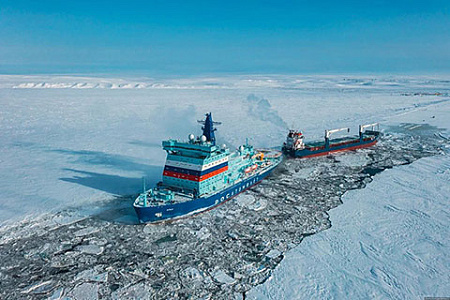
The area of the Arctic shelf of the Russian Federation is 3.8 million square kilometers, and it plays a significant role in ensuring the external, economic, energy and environmental security of our state. The initial total resources of the Arctic shelf are estimated at 110.5 billion tons in oil equivalent, while up to 90% of the resources belong to the lowest projected category, and proven reserves amount to about 14 billion tons in oil equivalent ‒ less than 13%.
For those who are far from the topic, it is worth explaining why the Russian continental shelf has been frequently mentioned lately. What is the shelf in simple terms? The shelf (from the English Shelf — shoal, reef, shoal) is a leveled area of the underwater margin of the mainland adjacent to the land. Most often, it becomes underwater as a result of destruction by waves, and therefore it is characterized by relief features and geological structure in common with land. Most continental shelves are wide, gently sloping plains covered with relatively shallow waters. The water depth above the continental shelves is 100-200 meters (although there are exceptions), on average about 60 meters. It is possible to extract minerals on the shelf, and it is clear that the boundaries of the shelf generally correlate with border issues, including the zone of economic interests of Russia.
Over the past few years, there has been a significant decrease in the volume of offshore seismic exploration by specialized companies, which leads to equipment downtime, decommissioning of a specialized research fleet, and limiting the pace of development of domestic technologies and equipment for geological exploration. The Ministry of Natural Resources and Environment of the Russian Federation notes that it is not possible to increase the financing of work on the continental shelf through the state program “Reproduction and Use of Natural resources”.
In this regard, in 2023, the Ministry of Natural Resources and Rosnedra, with the participation of maritime organizations, developed the Federal Project “The Continental Shelf of the Russian Federation” on geological exploration on the Russian shelf for the period 2024-2034, taking into account, among other things, work on the establishment of the boundaries of the extended continental shelf in the Arctic Ocean and the development of the Northern Sea Route. It has passed interdepartmental approvals and has been sent to the Government of the Russian Federation for consideration. Exploration work was scheduled to begin in 2024.
The set of measures of the Federal Project is aimed at continuing marine scientific research, surveys and work in order to expand and legally consolidate the outer boundary of the continental shelf of the Russian Federation in the Arctic Ocean, which will extend the jurisdiction and sovereign rights of the Russian Federation to significant territories of the Arctic Ocean and, after their delimitation with the opposing and adjacent states, begin the development of natural resources.
Economic interests are not the only goal. Such work helps to assess the current state of hazardous geological processes and phenomena, such as changes in the thermodynamic regime of frozen rocks, the presence of gas–saturated sediments, and local bottom irregularities that may affect navigation and navigation safety within the Northern Sea Route.
In the near future, the geopolitical processes in the world, including the struggle for influence in the Arctic, will only accelerate. In these circumstances, it is hardly advisable to postpone the tasks of exploring and developing the Arctic continental shelf of Russia indefinitely.
However, there is currently no targeted financing for offshore exploration, and the hydrocarbon resources of the continental shelf and the Arctic are considered a “reserve for future generations.” However, the rapid development of technologies for the development of offshore hydrocarbon deposits can contribute to their accelerated involvement in development.
Postponing the implementation of the Federal Project “The Continental Shelf of the Russian Federation” may lead to the loss of competence in marine geological and geophysical research. Its early approval could serve, in addition to maintaining the efficiency of the research fleet of Russian companies such as MAGE and the relevant organizations of the Rosgeologiya holding, to ensure the utilization of highly qualified personnel and the implementation of tasks related to the import substitution of scientific equipment.
Identification of potential accumulation zones and objects of hydrocarbon raw materials on the continental shelf of the Russian Federation, strengthening the evidence base of the Russian Federation’s submission to the UN Commission on the Limits of the Continental Shelf in the Arctic Ocean, identification of mineral reserves and geological information about the subsurface, development of the Northern Sea Route and ensuring the safety of navigation – all these are important strategic tasks that affect the development of the Arctic the zones of the country contribute to ensuring national security.
